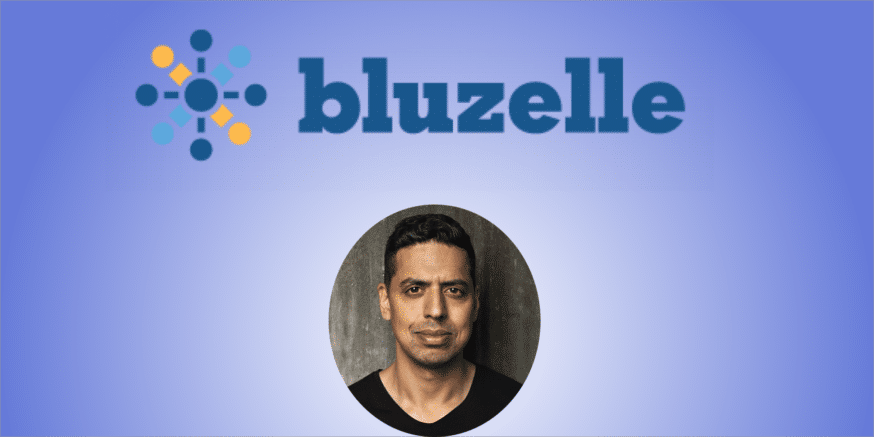Bluzelle CEO Pavel Bains Talks Decentralized Cloud Database
At this year’s Neo DevCon, we had the pleasure of sitting down with Pavel Bains, CEO of Bluzelle. The interview occurred at a time when Bluzelle was just coming out of its ICO and getting listed on major exchanges.
Most of the conversation was dedicated to fleshing out details of this new technology, especially the niche it fills in a budding blockchain ecosystem of cloud-based, decentralized platforms.
The Interview
CoinCentral: If you could give a quick rundown of your platform, how would you describe it?
Pavel Bains: The easiest thing to forget is there’s a massive amount of data being consumed by all applications and products. With all this data being exchanged, the current Internet just doesn’t have the infrastructure to protect its security, scalability and reliability. Bluzelle is a decentralized database service. It’s decentralized internet where if you apply blockchain principles, you can solve a lot of the issues of security and scaling.
Is this in the realm of decentralized cloud computing as well or is this different?
It would take that up a notch. Cloud computing is still centralized, whether it’s Oracle or Amazon. There are still central points of failure, they control it all. Through a decentralized database service, what we’re doing is taking your unused equipment like computers and servers and turning them into storage units. Because it’s decentralized like Bitcoin is, no one can take over the network and steal the data.
Why a decentralized cloud database instead of a centralized one?
When it’s centralized, you can have single points of failure. Let’s take the data breach that happened last year with Equifax Credit Scoring. If there’s a central point, that’s one area that a hacker or anybody could come into and break in to take everything. Alternatively, if they took that down, the whole system goes down. It’s similar to when AWS servers went down last year and half the internet, including Netflix, stopped operating. If you have decentralized, nothing is controlled. Someone would have to break into multiple places to try to take it over.
There are a lot of decentralized computing platforms out there like iExec RLC, SOMN, Golem, ETC. How is Bluzelle setting itself apart from these?
Those are really good examples. A lot of these blockchain projects like cryptocurrencies are building a decentralized internet, an ecosystem. If you look at Ethereum, let’s say that’s the new Windows or Apple iOS. It’s the operating system. If you look at Golem, that’s supercomputing because that’s needed for rendering. If you look at FileCoin or Storj, that’s file storage, so that would be the new Dropbox. What’s missing from that ecosystem? A database is always needed. Where Oracle was doing them in the traditional internet, we’re going to fill the gap on a decentralized internet. All those points that you brought, it’s a completion of an entire ecosystem and everyone is doing it at the same time and collaborating.
These are all building blocks and Bluzelle is laying a very important foundation to these building blocks?
I think one of the things that people forget in the blockchain or decentralized in this crypto world is a lot of people are focusing on crazy consumer applications. To me, that’s like putting electric cars on the road, but we’re still painting the lines and putting down the gravel and putting up the traffic lights. That’s why all the companies you named are the infrastructure ecosystem.
Going forward, the whole vision for blockchain is disrupting current industries and streamlining inefficiencies. What industries and what dApp use cases, especially, do you see benefiting from Bluzelle?
That’s a hard one because every single product needs a database. To store customer data, financial, whatever it is. Some of the current ones that we see are predictions markets on the blockchain. Our early target market will all be blockchain projects. Predictions markets, they’re taking a lot of data and they need to store it somewhere. They can’t store it on a blockchain, so hey, Bluzelle will be the database layer that does it. If you look at decentralized exchange protocols for crypto assets, they have a lot of market makers and order books that are done. A value-add is for those exchange protocols to know that Bluzelle will keep those market makers orders in proper functioning order. They can grab it fast and have everything organized in the proper way. Over the long term, it should be like any mobile or web application. Someone’s building a video game or the next MailChimp or Instagram. All that location data when they tag us and other information, that needs to be stored somewhere. It should be in a decentralized place, so nobody can hack in and take it.
Why two tokens? What’s the benefit and why did you decide to do that?
It was a long process to analyze it. You want to do an ERC-20 token because that’s easily exchangeable and everyone understands it and it’s a way to raise funds. The problem is, if you use that for a database, you’ll need to send out some data or grab it. Every time you do that, or you write to it, we have to come to a consensus that you are the owner, this is your data, and you’re writing it to our database service. If we wanted on Ethereum to confirm that…
You’re at the behest of the Ethereum blockchain, and as we’ve seen with crypto kitties, sometimes you’re at the mercy of digital furballs.
Right. So, let’s just say you’re a developer. Are you going to wait 30 seconds to a minute to get your data to do your product? No. By having an internal token, you can come into the system with your ERC-20. Once you’re in, it converts to the Bluzelle internal token and that’s how you do all your product stuff.
Does Bluzelle have it in their roadmap to move towards their own blockchain or do you not see a point because you have your own internal token that will be the utility token?
Not in the immediate future. Let’s get the product out, but I think over the long term as technology gets better and we think over the core fundamentals and basically almost have our own blockchain for it, then it would make more sense. We talked with all our advisors about two tokens and using state channels or if there are problems with that. We start with the two, internal and external, and we can phase that out later on.
You don’t see too many two token projects, but you might need two because it really does help cut out all latency issues and all the problems that come with that.
The main thing is if you’re a developer, whether this is secure, decentralized, things like that, what they want is the better product. If we’re saying it’s not as fast as a cloud one, then that causes issues for a developer.
You’ve got the security bit hands down, that’s undeniable. When you have those transaction delays, people start questioning why they’re using it if it’s slower.
You want your data fast because you’re building a product. That was always number one.
You started in Vancouver. Did you move your headquarters to Singapore or is it just a complimentary office?
No, Singapore became headquarters and Vancouver is more the RND center.
Why the move to Singapore?
We started the company in 2014 and it was to cut our teeth on a lot of blockchain projects. Over that timeframe, North America and Canada were regulatory and we didn’t know where it was going. Everybody was kind of slow and focused on banks. We were like everyone, trying to figure out what the real applications here were. Enterprise seemed to be the place to do blockchain. The banks were slow, and we thought about how Asia just adopts these technologies and skips a generation. Singapore, in particular, is one of the four financial centers in the world. They were also pushing Fintech. We thought if this is going to work, it’s going to work there. If it doesn’t work there, it’s not going to work anywhere. That’s what happened.
So, just more incentives and more of a reason to be out there in that market?
Yes. It wasn’t like the government was giving us stuff, they didn’t. It was just that they adopt faster. We’ve seen how Korea, Japan, China, they’re all just crypto, blockchain, boom, boom, boom.
America doesn’t want to fall behind in this industry. Congress needs to do something. They need to at least address it. We have seen very little in terms of any sort of tangible direction for how the government might take this.
If you look at what’s going on in Korea, internally, the government is split. I think it was the Department of Justice a couple weeks ago that wanted to shut down the cryptocurrency exchanges. Then their version of the White House, they said no, no no, we have to wait and see. There’s a lot of Korean people who are buying crypto and they signed a petition. There are millions of them that said no, they can’t. The people actually want this, so they can’t just go and close it.
Westerners may see China’s regulations as overly harsh and very free market restrictive, but they were saying how people still access exchanges through VPNs and that they like the regulations because it’s hoping to foster a more robust economy around crypto. As for us, there’s a loose regulatory framework with the SEC that you have to register these things as securities. Besides that, our government hasn’t put any formal legislation on the table. As western investors, we’re starting to get very frustrated. Without the government coming out and doing something, it will always be delegitimized in the public eye. People think that bitcoin is a Ponzi scheme.
People like Warren Buffet and others say that because they have to say it. Think about it. Their shareholders are coming to Berkshire Hathaway and these banks are going to their CEOs and saying that bitcoin is going crazy as an asset and asking why they’re not in it yet. They can’t say that they dropped the ball, they have to state it’s a scam. That’s their only defense.
When you have so many of these financial industries fighting for their lives against crypto and you have many different industries from dApps to smart contracts, you’re going to see a lot of jobs dissolved because they’re cutting out the fluff.
But if you think about it, a lot of these projects that are getting done now that are getting funded, like ourselves and others, they pitch to all these banks and insurers two years ago and they all declined. That’s when we said we can just build it ourselves now because the capital is there.
Never Miss Another Opportunity! Get hand selected news & info from our Crypto Experts so you can make educated, informed decisions that directly affect your crypto profits. Subscribe to CoinCentral free newsletter now.










